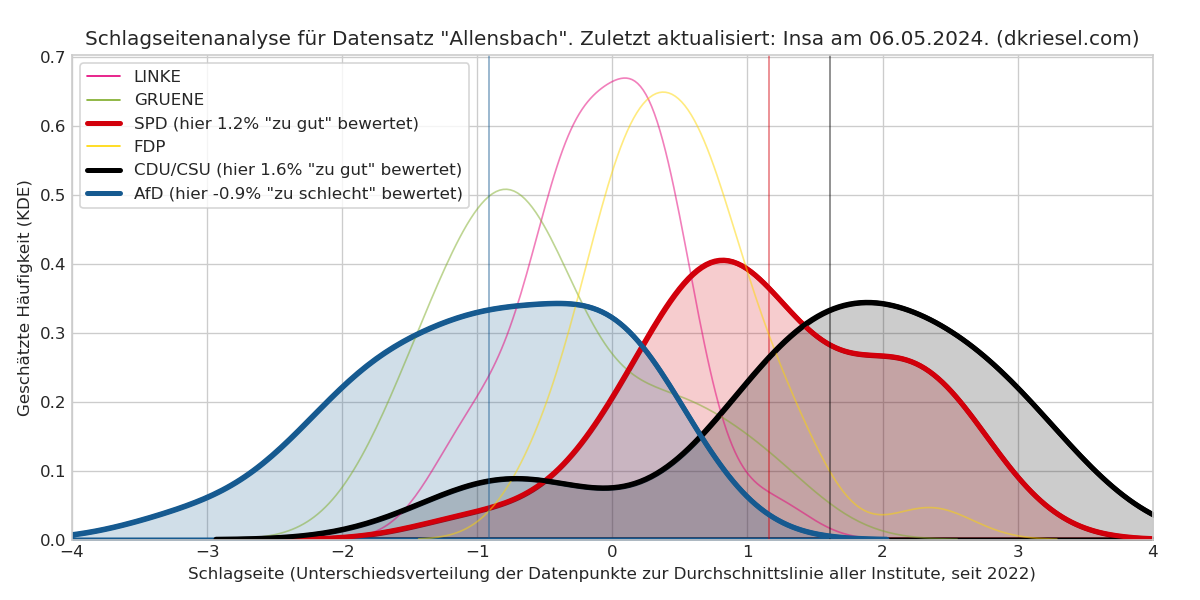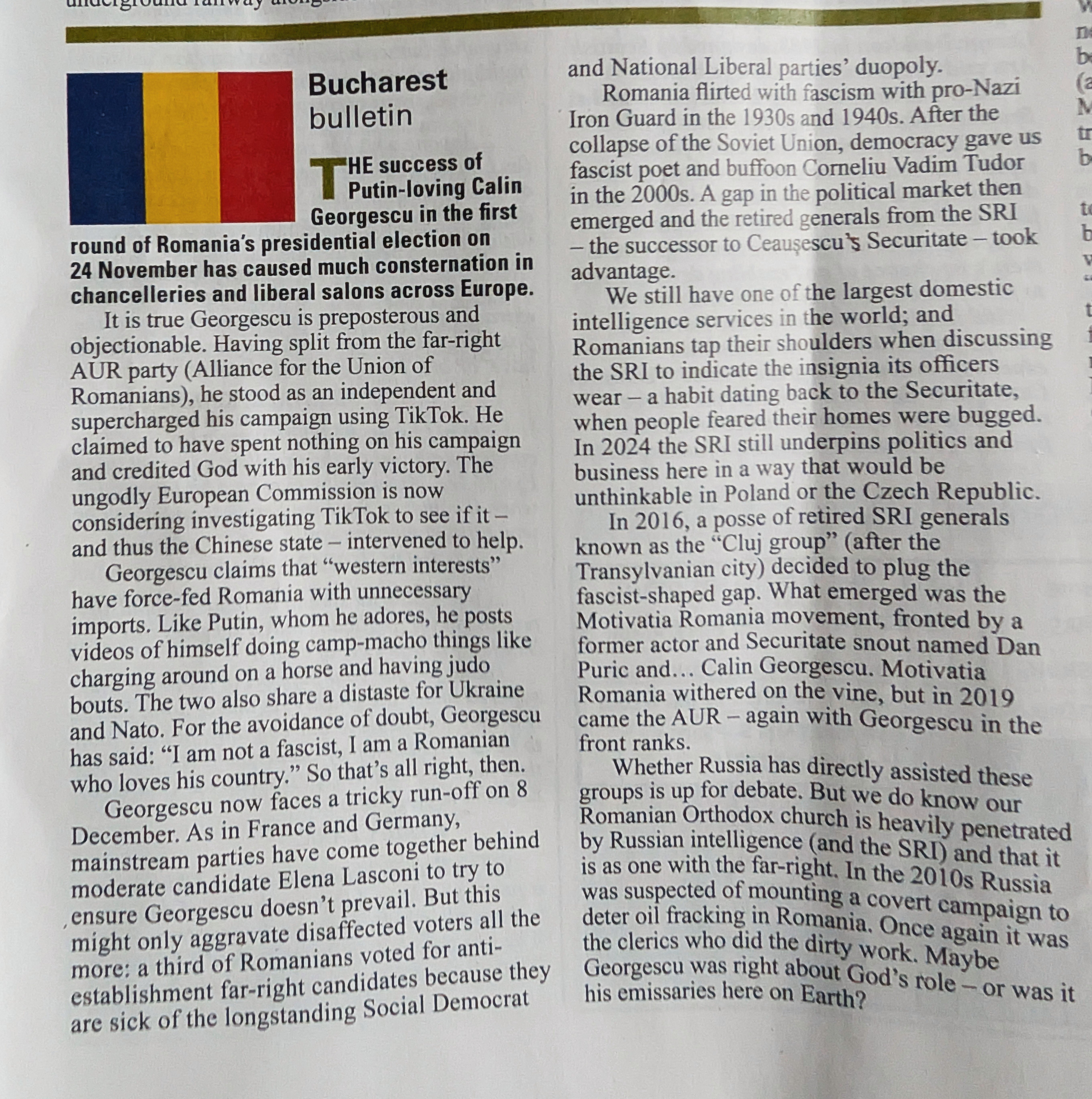Conclusion The CCR’s decision is a last resort attempt to prevent a further decline in the rule of law in Romania. Yet, its modalities, timing and face value are such as to shoot Romanian democracy in the foot. The gravity of the interference in Romania’s elections surely implied a need to intervene quickly, and to do something to protect democracy. The Court’s intervention however may more easily be seen as counter-productive in the long run. Once again, Romanian democracy stands on a shaky ground.
Not sure I entirely agree with this conclusion.
Their argument boils down to propriety. If the interference was spotted over both elections then both should be rerun not just the one in which the interference had material effect. This dissonance is amplified, they argue, when the election that is to be rerun is the one in which the incumbent (pro-EU) government was losing.
If we look first at the decision to rerun just the election that was effected we can easily understand it in terms of efficiency and momentum.
For an analogy let’s look at soccer: If a striker is bearing down on goal, in the penalty box, and he is cynically fouled the game is stopped, the offender sent off, a penalty awarded, then the game resumes.
However, if in the same scenario, a midfielder is fouled off the ball the play continues to allow the striker the opportunity to score. Once the ball is out of play the ref can return to the foul and dispense justice.
The penalty kick is a rerun of play, or the election in this analogy. It’s only necessary when the result of the game is heavily effected. If we stopped the game whilst a striker has a very good chance to score a goal when someone off the ball is fouled then it would incentivise bad faith teams fouling random players any time there was a clearcut chance.
This decision making takes into account the difficulty of creating a clear cut chance on goal in a game of football and doesn’t allow play to be disrupted. Foreign interference in elections has a wide range of desired outcomes but generally throwing a spanner into the engine of healthy democracies is what they are about. So if possible allow the play to continue. If play has been materially compromised then rerun.
The second aspect is the public perception. To which we can look to the US and see countless examples of the democrats hamstringing themselves by obsessing with playing by the rules and the republicans ignoring rules and precedent when it suits them. This happens because they don’t have a free press they have a bought press. I don’t know the makeup of media ownership in Romania but a democratic government has to be able to navigate a path to getting things done under the constant flack of belligerent entities. Sometimes it needs to have the metal to weather reputational trolling.
I find this deeper look quite interesting, thank you for sharing it.
To me there are two parts that stick out:
The decision largely reiterates EU, ECHR and Venice Commission principles and rules for the protection of electoral processes – all binding on and/or undersigned by the Romanian State – none of which prohibit the annulment of elections. To the contrary, the Code of Good Practice in Electoral Matters recommends annulment when transparency is prejudiced – especially via the non-disclosure of campaign financing, as was the case here…
I was previously under the impression that the bar for an annulement would lay mostly with interference in the ballot casting and counting itself. Coming to think of it i would like more stress on the transparency and election campaign fairness in other EU countries too.
Nonetheless, the Court’s decision is also highly paradoxical because it annulled the Presidential elections due to systemic violations of the right to free elections but failed to do the same in relation to the Parliamentary elections of December 1st. Yet these had also been marked by similar irregularities that were revealed by the same intelligence documents that the CCR based the December 6th Decision upon. In particular, the documents highlight that the aggressive TikTok campaign that took place in the two weeks predating the elections had also favored the newcomer party “Partidul Oamenilor Tineri (POT)”, which has supported Georgescu and is now part of Romania’s Parliament, having gained roughly 6% of votes in the recent Parliamentary elections.
I wasn’t aware of this until now. I find the reasoning quite important. If the interference is evident for both elections (parliament and president) the decision to annule or not must be equal for both elections.
Judging by the success of the interference rather than the intensity of interference ultimately requires a judgement of how the result “should have been”, which contradicts free elections.
There needs to be a reasonable degree to which interference with an election should be weathered (not ignored but the process to continue). Elections are very costly and disruptive. It would be insane to redo an entire election because you found that one person voted twice. The point at which you do redo it needs to be cognizant of the degree of disruption caused.
I think we mostly agree.
However the degree of disruption in my eyes should be measured by the means used, rather than the outcome.
As an example: If there would be a million more ballots than eligble voters, it should not matter for which party. The interference itself is the criteria, not which parties it benefited. So lrts imagine if the election got rigged by multiple parties in such a way that the result fits the expectations. It was still rigged severely and needs to be redone.
In the specific case of Romania the intelligence provided evidence for a coordinated interference in both elections that also was linked together. I find it hard to imagine that the interference in the parliament election was less intense, even if the result is assumed to not have been as severe.
Intensity isn’t a specific enough criteria. It has to be impact.
Intensity is a completely pointless measure for judgement because efforts can, in principle, have no impact at all. It would open the door wide to the adversary denying any kind of elections for very cheap: No planning necessary, no subtlety necessary, just employ sufficient effort to overcome the intensity bar. It is a suitable measure when it comes to deciding whether to have a closer look at things, though.
How do you measure impact? By saying party X has Y% too much or little. Candidate Z should only have gotten A% etc.
This cannot be measured objectively or specifically because you need to know the “expected outcome” and as we see, the “expected outcome” of the ruling party is that they should win both elections. This voids the freedom and fairness of elections. If someone is fucking up hard a week before the election and the electorate reacts to it, they can just as easily trump up some alleged interference as the last poll before his fuck up had a very different result.
Also for the example of too many ballots in a strony rigged process. Say you have two major parties pulling it off, the main ruling and main opposition party. Because they both do it, the result is within what was “expected”, yet the election completely rigged and smaller parties kept out effectively.
So intensity is the more objective criteria. If candidate Z has millions in illegal funds that is measureable. If in a voting district there is too many or too little ballots to how many people voted this number is neutral and measureable.
Statistics can help decern impact. But I think there’s always going this be some measure of subjectivity no matter which way you try to call it.
Using an unsuitable measure over a suitable one because the unsuitable is more accurate is not a big-brain move. I cannot measure the future movements of the stock market, but I can measure the position of tea leaves in my cup very accurately, so surely the tea leaves are a good basis to inform investment decisions.
Also this wasn’t about ballot stuffing, but campaign finance transparency.
You can relate the illegit campaign finacing to the total campaign financing and objectively relate it to each other.
You cannot relate the outcome except to the last polls. However polls have systematic errors, polls themselves influence the elections heavily and they cannot cover what happens in the time between.
As an example there was the state election in Germanys Saxony Anhalt. The CDU won by 7-10% more than the polls had envisioned. In total terms that an increase of 20-25% compared to the polls. The reason was that people got scared by the last polls, that the AfD could become strongest party.
Now by the logic of measuring interference by the “result” vs. the “expected result” this election should have been voided. This would be deeply undemocratic and effectively move the power from the people voting to the people defining the “expected result” through running the polling companies.
https://en.wikipedia.org/wiki/2021_Saxony-Anhalt_state_election#Party_polling
Unsurprisingly polling companies have systematic bias towards certain parties, which align with their political leaning.
Here is the website of a Data Analysts who runs some statistics on election polling in Germany, to give a more accurate picture, compared to the individual polls.https://www.dkriesel.com/sonntagsfrage

So going by “result” vs “expected result” is more like going by the tea leaves.
The reason was that people got scared by the last polls, that the AfD could become strongest party.
That is an objective assessment relating a cause to an effect. It’s not random guesswork, it can be substantiated in various ways. But the cause was not illegitimate, thus the result is still valid.
Precisely the same thing can be done relating illegitimate causes to effects. A low effort can have a high effect, and high effort can have can have a negligible effect, and everything in between.
The question was whether we should be invalidating elections when the effort to influence them illegitimately was high, or when those efforts had a high effect. And the answer, of course, is “whatever is best for democracy”. What’s best for democracy is to go with the impact, not going by effort: Otherwise Russia could spend a couple millions each election without having any effect and completely deny Romania to ever elect a president.
So: Elections get invalidated if a) there was illegitimate influence and b) if said influence had too large of an impact. The actually fuzzy thing here is “too large of an impact”, not “how do we relate influence to impact”, and just as with things like Radbruch’s formula there won’t ever be complete clarity on what’s “too much” but some lines can be drawn with confidence, say, when a “further ran” candidate comes in first in a way that can be directly, and practically entirely, attributed to a highly illegal TikTok campaign. Another line that can be drawn is if he would have come in third, or any lower place, not entering run-offs. A thing that would be fuzzy is his campaign, indirectly, switching out one of the top two candidates for a third one. In such instances it would be good I think to be able to first have a run-off between all three candidates, then, if there’s no clear winner, have a third run-off. That would minimise the effect of the illegal campaign without re-doing the initial vote.

This is a bit of context from the Dec 6th edition of Private Eye.



